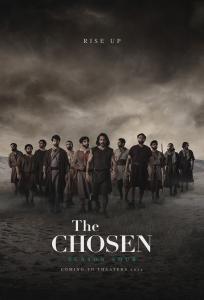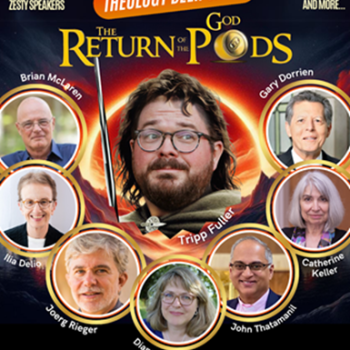Regular readers of this blog know that I am a big fan of “The Chosen,” a multi-year cinematic treatment of the life of Jesus that is currently filming the fifth of a projected seven seasons. The fourth season ends with Jesus riding a donkey toward Jerusalem, followed by the men and women who have become part of his inner circle entourage (including a number of women). Like all dedicated fans of “The Chosen,” Jeanne and I cannot wait for season five to drop.
Although the creators of the series come from an evangelical Protestant background, they are very careful to gather insights and input from Catholic and Jewish perspectives when writing the script. They also are clear that the show is not the Bible—it is a television show that takes liberties both for the sake of a good story and entertainment. In addition to the episodes there is a seemingly endless supply of additional material—interviews, roundtable discussions, behind the scenes peeks, and more—to satisfy even the most ravenous fan. I almost never watch any of the additional material, but did take a look at something on “The Chosen” Facebook site a couple of days ago.
After each episode, creator Dallas Jenkins (Protestant) has a “roundtable discussion” with a Catholic priest and a Jewish rabbi about various aspects of the episode, including different perspectives on character development of Jesus and others that goes far beyond anything specifically in the gospels, filling in the gaps in the gospel narrative for the sake of coherent story, places where different versions of monotheism might differ, and more. Warning: slight spoiler alert to follow!
The roundtable in question was connected to a season four episode in which an important character (one who is not in the gospels) unexpectedly and tragically is killed. Many commenters expressed their shock at the character’s death, but even more were shocked that Jesus didn’t do anything about it. In the episode, Jesus arrives on scene within a minute or so of the tragedy; he clearly is saddened by what he sees, but does not step forward and set things right by healing or raising the dead person, even though others present beg him and clearly expect him to do so.
The idea of Jesus not immediately healing and raising people from the dead when given the opportunity caused many of the hundreds of Facebook commenters to have a fit. Comments such as “there is no place in the Bible where Jesus encountered a dead person and did not raise that person back to life” and “Jesus never refused to heal someone when given the opportunity” filled up the thread. Several people wrote that they would never watch another episode of “The Chosen” because of this scene.
I couldn’t help thinking about how many of the folks who were regulars at the church I was raised in would have said similar things. I was taught that the Bible is the infallible, inerrant Word of God, to be handled with virtual kid gloves and to be respected as if it was glowing with divine radiance. The Bible is God’s final word to us. For all intents and purposes, we were Bible-worshippers. There are millions of them still among us. Take this quick, informal quiz: You might be a Bible-worshipper if . . .
- You think that “the Bible says” is a good conversation stopper rather than a conversation starter.
- You frequently use the words “infallible” and “inerrant” when talking about the Bible.
- You believe that God essentially dictated the content of the Bible to human beings who just recorded what God told them to write.
- You say things like “that’s not scriptural” and “that’s not in the Bible” frequently when viewing movies/television shows or reading books related to the Bible.
- You believe that the answer to every problem and question that life might throw in your direction is in the Bible.
- You believe that there are no contradictions in the Bible.
- You think that God will never act or communicate in ways that contradict anything in the Bible.
- You tend to be very judgmental and dismissive of people who disagree with any of the above concerning the Bible.
Let me reiterate that I’m not gathering the above second-hand. This is the world I was raised in. Although I left it in my early adult years, I have many friends and family members who would happily check off each of the above points. If you resonate positively with the majority of the above bullet points, I submit that you are a Bible-worshipper. And that’s not a good thing.
I remember as if it was yesterday a conversation (debate? disagreement?) I had with someone on social media several years ago concerning the opening verses of John’s gospel: “In the beginning was the Word, and the Word was with God, and the Word was God.” In response to my suggestion that the Bible is a special book, but one written by human beings rather than dictated by God, the other person responded that anyone who denies the inerrancy of scripture cannot legitimately call themselves “Christian.” Rejecting scriptural inerrancy is the same as rejecting the authority of God in one’s life.
I responded, rather defensively, that I found it sad to imagine a faith so narrow that it claims that God is confined within the covers of a book. That God somehow is incapable of speaking directly to contemporary human beings. That the Word of God is a book rather than a Person. God is brought into the world through human beings, not ancient texts.
I could have done better. I could have used the very book that the fellow I was arguing with worships to make my point as the next participant in the conversation did succinctly in short order by simply using John’s gospel:
John 1:1—In the beginning was the Word. John 1:14—And the Word was made flesh and dwelt among us . . . The Bible isn’t the Word of God, but it can lead us to the Word of God.
The Word is not a book, in other words. The Word is a Person.













